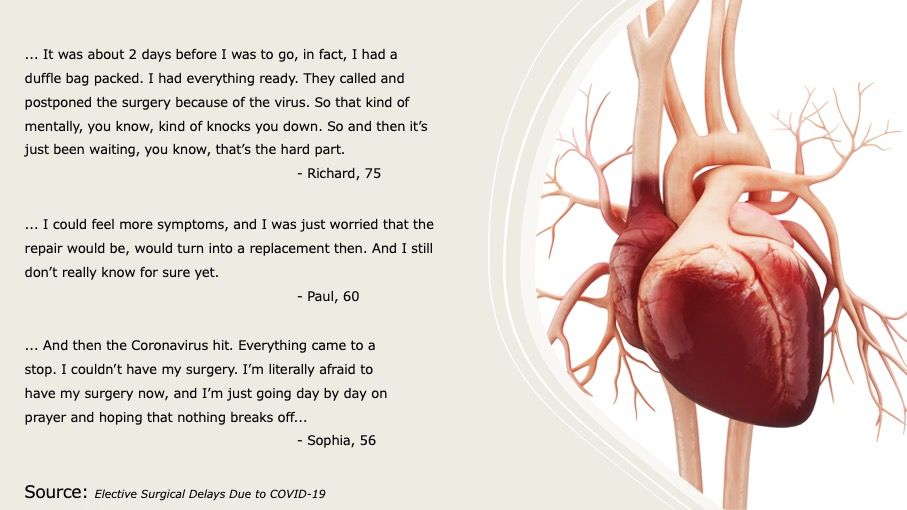Delaying, Cancelling Surgeries Has Taken Toll on Patients with Cardiovascular Conditions
Data from phone interviews indicate patients who had cardiovascular surgeries delayed or cancelled as a result of the COVID-19 pandemic may have experienced additional psychological stress as a result.
Mary Byrnes, PhD

While many studies have assessed the impact fear of COVID-19 has caused on visits to emergency departments, new research is describing the impact of mass cancellations of elected surgeries, particularly cardiovascular procedures, has had on patients.
Despite having a smaller sample size, results of the qualitative research indicate patients who had cardiac or vascular procedures postponed or cancelled as a result of the pandemic could experience additional emotional and psychological distress as a result and may require additional care during postoperative recovery.
“There’s been other work coming out that said patients don’t really care about delaying their surgeries, but the heart is a different type of organ that has a lot of emotions wrapped around it. It’s literary even,” said Mary Byrnes, PhD, an assistant research scientist in the Department of Surgery at Michigan Medicine, in a statement. “And even though these were elective surgeries, they were serious operations where people were literally having their chests cracked open, and so there was a lot of mental preparation to confront that in the first place. Ultimately, they viewed surgery as a cure, so the unknowing about whether it would happen was problematic for them.”
To further understand the impact of the ongoing COVID-19 pandemic on care of patients with cardiovascular conditions, Byrnes and a team of colleagues from Michigan Medicine sought to explore the life experiences of patients who had surgeries at the Frankel Cardiovascular Center cancelled or delayed from March 13-June 1, 2020. From their initial search, investigators identified 310 patients who met these criteria and, subsequently, contacted 74 of these patients.
Among the 74, 47 agreed and participated in a telephone interview, which occurred from May 8-23, 2020, related to their experiences. Of note, 57 patients initially agreed to take part but 10 were unable to be reached for scheduled calls. Interviews were designed using traditional phenomenological interview techniques and elaborated with active interviewing. Interviews lasted 25-75 minutes and assessed domains related to everyday life, surgery, COVID-19, and the delay/cancellation.
Patient Experiences
Upon analysis, investigators identified 3 specific issues that appeared nonimpact patients as a result of postponement or cancellation of their elected procedure. During their interviews, patients described narratives where they viewed elective surgeries as a chance to “return to normal”, discussed their belief that postponement took a toll on management of physical health and emotional well-being, and some expressed a fear of COVID-19 that outweighed the potential consequences of further postponement.

“As a healthcare system, we may also need to design and implement interventions, such as support systems or social work resources, to minimize the impact these delays have on the well-being of our patients,” said Craig Brown, MD, MS, study investigator and a general surgery resident at Michigan Medicine, in the aforementioned statement. “It is not simply an inconvenience to many of them, but rather has dramatic consequences and substantial psychological impacts on their wellbeing.”
This study, “Elective Surgical Delays Due to COVID-19,” was published in Medical Care.